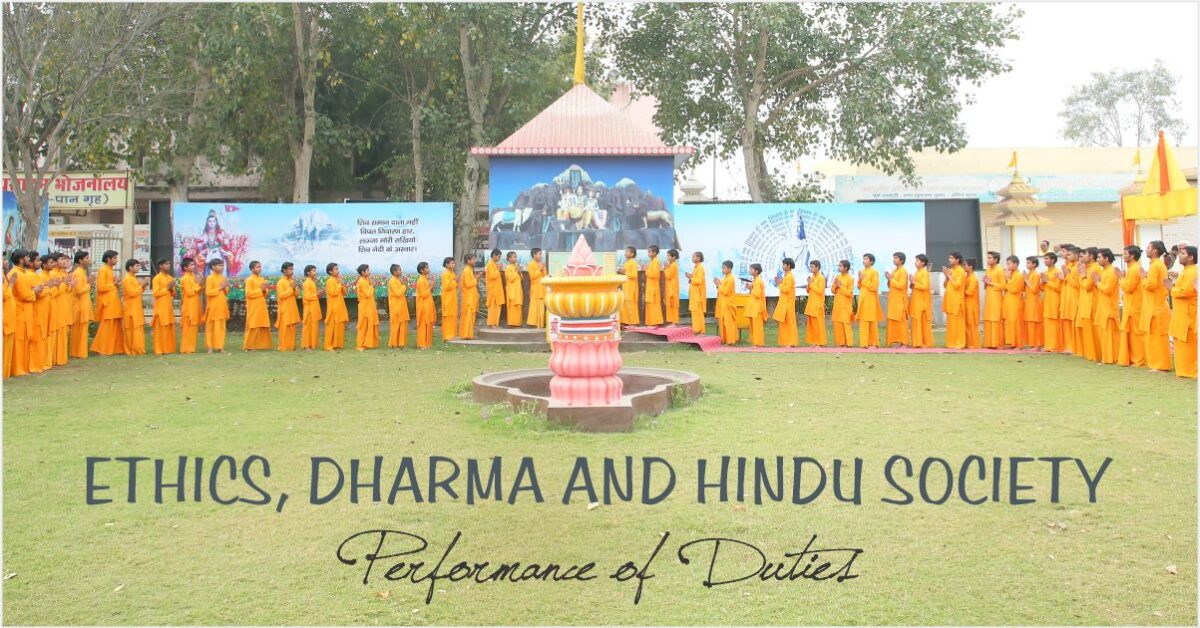ETHICS, DHARMA AND HINDU SOCIETY | Sudhanshu Ji Maharaj
ETHICS, DHARMA AND HINDU SOCIETY: (Performance of Duties)
Ahimsa – non-violence in action, words, and thoughts – is considered the highest ethical value and virtue in Hinduism. Ethics is called Nitishastra in ancient texts of Hinduism. Ethics and virtue are much debated in
ancient scriptures of Hinduism. Virtue, right conduct, ethics, and morality are part of the complex concept Hindus call Dharma – everything that is essential for people, the world, and nature to exist and prosper together, in harmony. Ethics are explained in Hindu philosophy as something that cannot be imposed, but something that is
realized and voluntarily lived up to by everyone. Ethics that constitute a dharmic life – that is a moral, ethical, virtuous life – evolve in Vedas and Upanishads. Manu Samhita initially listed ten
virtues necessary for a human being to live a dharmic life:
Dhriti [Courage],
Kshama [Forgiveness],
Dam [Power],
Asteya [Non-covetousness/Non-stealing],
Shaucha [Inner purity],
Indrayani-Graha [Control of senses],
Dhi [Reflective prudence],
Vidya [Wisdom],
Satyam [Truthfulness],
Akrodha [Freedom from anger].
Ethics expect:
A man shall not kill; nor lie; nor steal; nor hoard up treasures. These correspond to five Yamas of ancient Hindu ethics: Ahimsa [non-violence], Satya [truth, no falsehood], Asteya [non- stealing], Brahmacharya [celibacy if unmarried and non-cheating on one’s partner if married], and Aparigraha [no possessiveness].
In addition to these five negative things to abstain from, Hindu ethics also recommend five positive things to strive for as Niyamas: Shauna [purity in body, speech and mind], Santosha [contentment, acceptance of circumstances with optimism], Tapas [perseverance, meditation, austerity], Swadhyaya [lifelong learning] and Pranidhan [right attitude, contemplation].
Dharma and Ethics
The key to the individual and social ethics of Hinduism is the conception of Dharma [Dharma here means the act of duty, performance of service, having belief in something superior and the practice that needs to be followed sincerely and in its true sense]. A person’s Dharma is not imposed by society or decreed by an arbitrary God but is something with which he is born as a result of his actions in previous lives. Dharma
determines a man’s proper attitude toward the outer world and governs his mental and physical reactions in each situation. It is his code of honor.
Performance of Duties
Hindu philosophers encourage the performance of duties, but they exhort men to perform them not from a sense of compulsion but through love. Unless a man is inspired by love, he cannot cheerfully perform his duty at home, in the office, in the factory, or on the battlefield. This love is not, however, sentimentality, but springs from
the perception of God in all living beings. Work done under the impulsion of duty deepens a man’s attachment to the world, but when performed through love it brings him nearer to freedom.
The healthy social environment created by objective ethics provides men with an opportunity to cultivate the more important subjective ethics. The disciplines of subjective ethics for the liberation of the soul have been stressed in the Bhagavad Gita and the Upanishads. The Gita says: ‘Let a man lift himself up by his own self; let him not depress himself; for he himself is his friend and he himself is his enemy. To him who has conquered himself by himself, his own self is a friend, but to him who has not conquered himself, his own self is hostile like an external enemy.’
Moral and Ethical Ideals of Hindus
Ethics can be described as the science of morality, and morality as the living of a virtuous life. Hindus place greater emphasis on the attitude of the mind rather than on the postulation of the elaborate theories of what is right and what is wrong. Accordingly, the Hindu vision of morality and ethics is characterized by the following considerations: – Morality proceeds from the inner spirit of man. In the Hindu view, one’s motive is as important in the performance of action as the action itself. When the heart is pure and free from lust and greed, whatever
one does to perform one’s duties has a high moral value;
Harmlessness to all creatures is the highest morality;
There are four sources of right conduct: Vedas, the Smriti
[secondary scriptures], the conduct of wise persons, and the
individual’s own judgment;
In times of confusion and crisis regarding what is right and what is
wrong, one’s own conscience is the sole guide. “In times of doubt,
O, son of Kunti [Arjuna], one must decide using one’s own good
sense.”;
An individual is ultimately responsible for his own actions, i.e. the
Law of Karma. He is also responsible for the actions of others if he
induces or forces them to perform such actions;
Hindus declare that loyalty to one’s moral values is the highest
loyalty, and of all the losses, loss of one’s character and loss of
judgment is the worse.
Self-Control and Patience
We should observe self-control and patience in our life. We should observe tenderness easiness, coolness, smile on the face, and get rid of cruelty and bitterness in the world. If your mind is forcing, you towards worldly belongings then by having control over it try to adopt a better approach. Just have a look at Lord Ganesha. There is a goad in his one hand and half of his body is that of an elephant. This means that a simple and small goad can also control an elephantine power. This way you too can discipline your conduct by consolidating the power of goodness. In this world there live many good people as well and there are wicked people. In other words, in every person lives goodness and wickedness. It should be tried that goodness grows within your life to feel happy.

